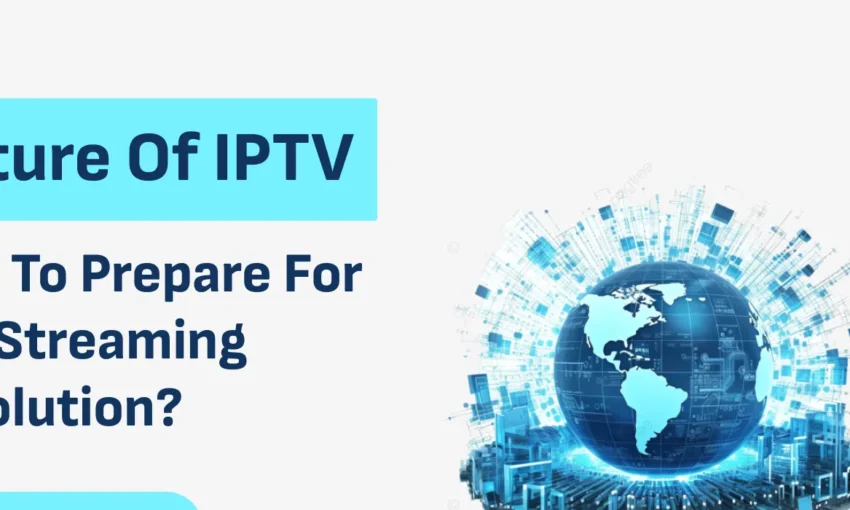Introduction
The way people watch television is evolving at a rapid pace. Internet Protocol Television (IPTV) is gradually replacing traditional TV formats, offering viewers greater flexibility, improved picture quality, and an extensive content library. With high-speed internet now accessible to millions of households and smart devices becoming the standard, IPTV is undoubtedly the future of entertainment in the UK.
However, what does the future truly hold for IPTV in the UK? Will it dominate the television industry and replace traditional broadcasting altogether? Or will it face strong competition from global streaming giants such as Netflix and Amazon Prime?
According to a report from Ofcom, more than 50% of UK households now use on-demand and streaming services as their primary source of entertainment. This trend highlights the increasing shift towards IPTV. At the same time, advancements in 5G connectivity, AI-powered recommendations, and 4K streaming are propelling IPTV technology forward (Digital TV Europe). As we explore the future of IPTV, we will examine the driving forces behind this shift, the potential challenges ahead, and the exciting innovations that are set to redefine television as we know it.
The Evolution of Television Broadcasting in the UK
From Traditional TV to IPTV: A Shift in Viewing Habits
Television broadcasting has undergone several major transformations over the decades. Traditional broadcasting methods, including terrestrial, satellite, and cable TV, dominated UK households for years. While these methods provided structured programming, they also came with limitations.
- Limited channel selection – Viewers were restricted to what was available on their respective providers.
- High subscription costs – Cable and satellite TV providers charged premium rates.
- Lack of flexibility – Audiences had to adhere to fixed schedules, with little control over their viewing experience.
With the introduction of IPTV, viewers now have the freedom to watch what they want, whenever they want. The ability to stream content on multiple devices, pause live TV, and choose from an expansive catalog of on-demand programs has made IPTV a game-changer.
For a comprehensive overview of IPTV services in the UK, explore our guide on IPTV UK On-Demand.
The Current State of IPTV in the UK
How IPTV is Changing the UK Market
IPTV has become an integral part of the UK entertainment industry, with more households moving away from traditional cable and satellite TV. Today, IPTV services offer:
- A wide range of live TV channels
- Affordable subscription plans compared to cable TV
- High-definition (HD) and Ultra-HD (4K) streaming
- Multi-device compatibility, including smart TVs, smartphones, and laptops
Comparing IPTV to Other Streaming Platforms
| Feature | IPTV Services (e.g., Tiviprime) | Streaming Platforms (e.g., Netflix) |
|---|---|---|
| Live TV | ✔️ Yes | ❌ No |
| 4K & UHD | ✔️ Yes | ✔️ Yes |
| Subscription Cost | Lower than cable TV | Higher due to licensing costs |
| On-Demand | ✔️ Yes | ✔️ Yes |
This comparison highlights the advantages of IPTV over traditional cable TV, particularly in terms of flexibility and affordability.
Technological Innovations Driving IPTV Forward
5G Connectivity and Its Impact on IPTV
With the rollout of 5G networks across the UK, IPTV is set to become even more efficient. Faster internet speeds will allow:
- Reduced buffering times – High-speed connections mean smooth streaming.
- Mobile IPTV experiences – Users can stream high-quality content from anywhere.
- Improved interactive features – Real-time engagement with live broadcasts.
AI and Personalized Recommendations in IPTV
Artificial intelligence (AI) is transforming how IPTV services suggest content to users. By analyzing viewing history, preferences, and trends, AI enables:
- Better content recommendations – Viewers get suggestions tailored to their interests.
- Smarter search functions – Finding new shows and movies becomes easier.
- Improved user experience – A more intuitive and enjoyable interface.
4K and Ultra HD Streaming in IPTV
As more people demand high-quality video, IPTV services continue to expand their 4K and Ultra HD content offerings. However, for smooth 4K streaming, a high-speed internet connection of at least 25 Mbps is required.
Learn more about 4K IPTV streaming quality and how to enhance your viewing experience in our guide on IPTV Streaming Quality Tips.
Regulatory and Legal Considerations for IPTV in the UK
Content Licensing and Copyright Issues
IPTV providers must comply with UK copyright laws when broadcasting live TV and on-demand content. Unauthorized IPTV services, often referred to as “pirate IPTV”, violate copyright laws, leading to legal consequences.
Net Neutrality and Fair Access to IPTV
Net neutrality plays a crucial role in ensuring equal access to IPTV services for all users. If internet service providers (ISPs) impose speed throttling on IPTV, it could create an unfair disadvantage for certain providers.
Challenges Facing IPTV Growth in the UK
The Rise of Global Streaming Giants
One of the biggest obstacles IPTV providers face is competition from international streaming platforms like:
- Netflix
- Disney+
- Amazon Prime Video
These platforms already dominate the streaming industry, making it harder for UK-based IPTV providers to stand out.
The Impact of Internet Speed on IPTV Services
While IPTV offers superior flexibility, it heavily relies on internet speed and stability. Without high-speed broadband, buffering issues may arise, reducing the quality of service.
Future Opportunities for IPTV in the UK
The Growth of Niche IPTV Services
To stay competitive, IPTV providers are exploring niche content services, such as:
- Sports-focused IPTV services for live sports events.
- News-specific IPTV streaming for real-time updates.
- Regional IPTV services catering to different languages and cultures.
Discover more about niche IPTV services in the UK by reading our article on Best IPTV Packages in the UK.
Collaboration Between IPTV and Traditional Broadcasters
Rather than competing with traditional TV providers, IPTV services are beginning to collaborate with broadcasters like BBC and ITV to offer hybrid models that combine live TV with streaming.
The Rise of Interactive IPTV and Augmented Reality
The future of IPTV goes beyond traditional video streaming. Soon, we will see interactive TV features such as:
- Live sports statistics on-screen during matches.
- Real-time audience participation in reality shows.
- Augmented reality (AR) integration for immersive viewing experiences.
As more households shift towards on-demand viewing, IPTV will continue to grow. Providers that prioritize user experience, enhance content offerings, and adapt to new technologies will ultimately lead the IPTV revolution in the UK.
Frequently Asked Questions (FAQs) About Future of IPTV in the UK
What is IPTV, and how does it differ from cable TV?
IPTV delivers content via the internet, unlike cable TV, which uses satellite or fiber-optic networks.
Is IPTV legal in the UK?
Yes, licensed IPTV services are completely legal. However, pirate IPTV providers operate illegally and face strict penalties.
Do I need a TV license to watch IPTV?
You do not need a TV license for on-demand IPTV. However, for live IPTV streaming, a TV license may be required.
Conclusion
IPTV Is the Future of UK Entertainment
The television industry is changing faster than ever before. More UK viewers are switching from traditional cable TV to Internet Protocol Television (IPTV). This shift is happening because IPTV provides greater flexibility, better picture quality, and lower costs. Unlike cable, IPTV does not require expensive infrastructure. Instead, it relies on high-speed internet, making it accessible to a wider audience. With features like live TV, on-demand content, and multi-device compatibility, IPTV is becoming the preferred choice for modern entertainment.
Technology Will Shape the Next Generation of IPTV
Advancements in 5G, artificial intelligence, and 4K streaming are driving IPTV forward. As internet speeds improve, viewers will enjoy faster loading times, ultra-high-definition content, and seamless streaming. AI-powered recommendations will create personalized viewing experiences, making it easier for users to discover new content. Additionally, integration with smart home devices will make IPTV more convenient than ever before. These improvements will help IPTV providers compete with major streaming platforms like Netflix, Amazon Prime, and Disney+.
Challenges Must Be Addressed for IPTV to Succeed
Despite its growth, IPTV faces several challenges. One of the biggest concerns is content licensing and piracy. Unauthorized IPTV providers continue to stream copyrighted content illegally, which hurts both content creators and legal IPTV businesses. The UK government is increasing efforts to shut down illegal IPTV services, but users must also choose legitimate providers. Another major challenge is broadband speed, especially in rural areas. Without high-speed internet, IPTV services cannot deliver smooth and high-quality streaming. Providers must work with broadband companies to ensure widespread internet access for IPTV to reach its full potential.
The Future of IPTV in the UK Looks Promising
Even with these challenges, IPTV has a bright future in the UK. More people are embracing on-demand streaming, personalized recommendations, and interactive content. IPTV providers that focus on innovation, legal compliance, and superior user experiences will lead the industry. The rise of niche IPTV services, such as sports-focused and regional language IPTV, will attract more viewers. As technology advances, IPTV will continue to change the way people watch television. For viewers who want flexibility, affordability, and high-quality streaming, IPTV is the future of entertainment in the UK.

